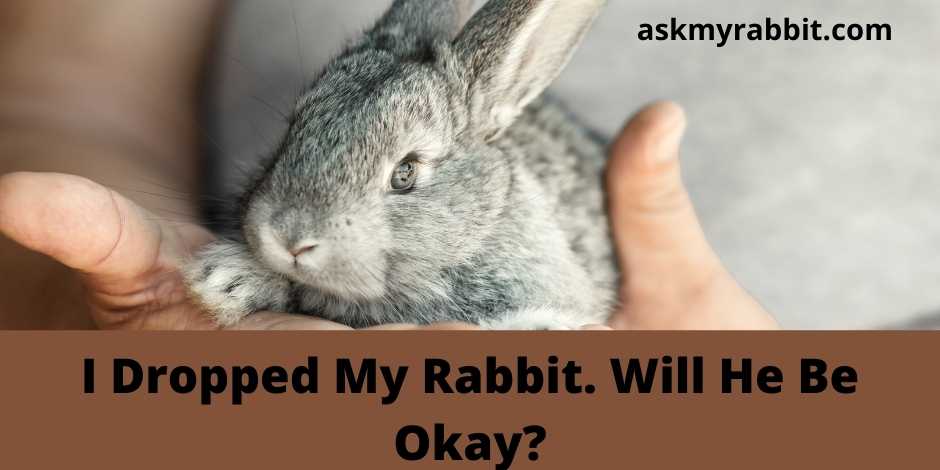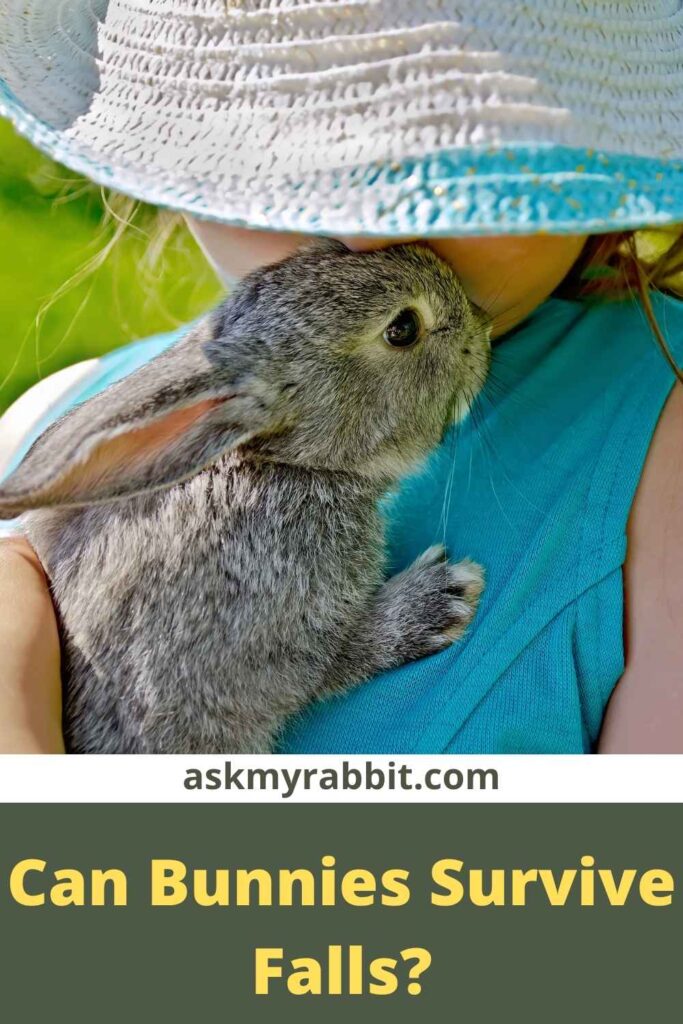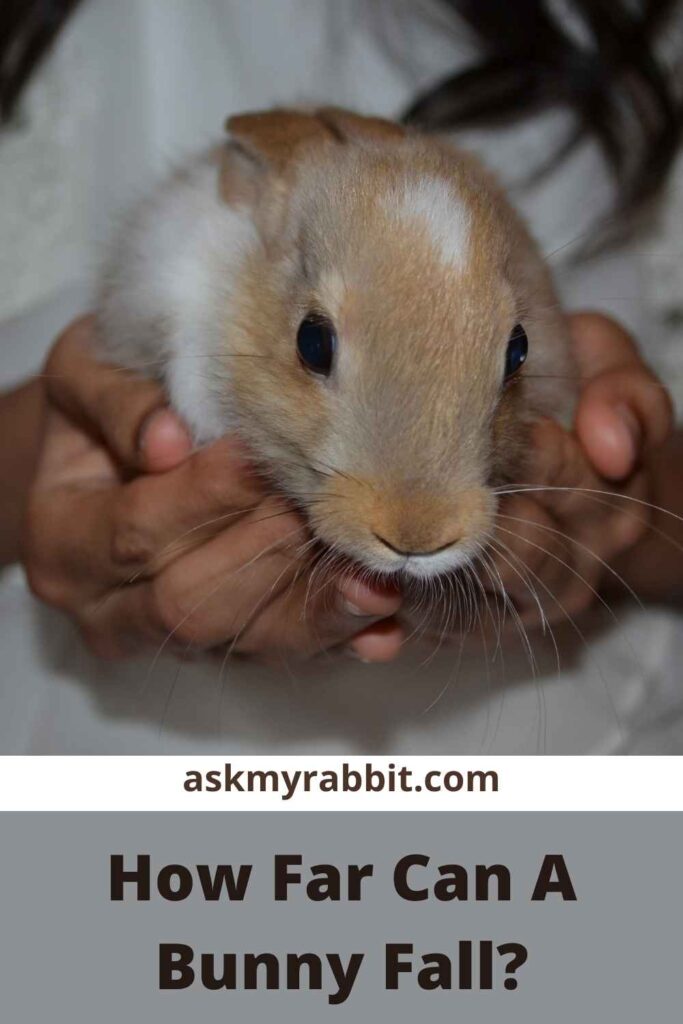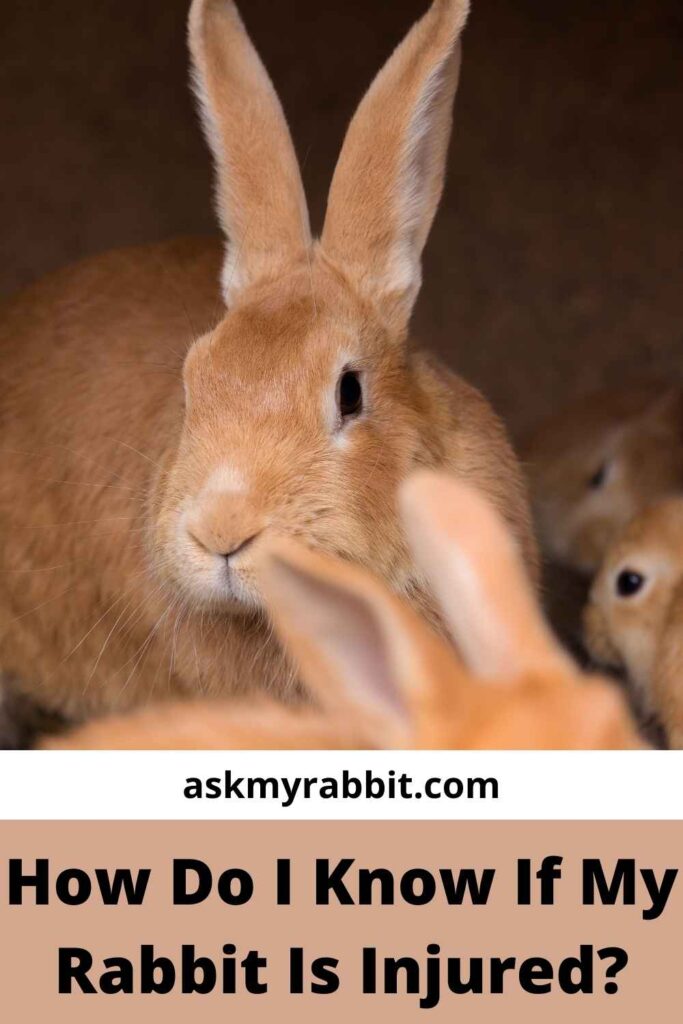As a rabbit owner, you may make mistakes from time to time. With time and experience, you learn how to manage situations properly. Dropping your rabbit is very unfortunate and worrisome for an owner.
If you have dropped your bunny by mistake, do not panic. Instead, calm yourself down and observe your bunny to assess the extent of his injuries, if there are any.
Begin by palpating the whole body to look for any evident wounds or uncomfortable places. You should take the rabbit to the veterinarian as soon as possible if he shows signs of injury or behavioural changes.
Make sure the rabbit does not have any evident injuries, such as fractured bones. Watch out for the formation of abscesses. This is a common issue when rabbits are injured but don’t show any evident wounds.
You can’t always tell whether your rabbit is wounded by looking at him or her. This is because rabbits, as prey animals, are quite skilled at masking indications of pain from injury or disease. A veterinarian should be consulted immediately, regardless of whether or not the bunny shows any visible indications of damage.
In this article, we will inform you all about rabbits and their relationship with height. So, keep reading!

Can Bunnies Survive Falls?

Yes, bunnies are able to survive falls from small heights. Generally speaking, rabbits are able to safely fall from the same heights they are able to leap. All the same, make sure there are safe places to land when feasible. Even strategically-placed pillows are a good idea to place in order to prevent bunnies from hurting themselves.
It’s critical to know how falling will affect the joints of your rabbit. Damage might occur whenever they are subjected to a traumatic event. Your rabbit may get immobile as a result of this. This danger may be reduced by using carpets.
Falling may have a psychological effect on a rabbit as well. Rabbits are prone to anxiety. They may be scared to death if they fall suddenly and hit themselves.
As a result, there will be a ripple effect. Behavior may change as a result of the rabbit no longer feeling secure. It’s possible that they’ll suffer from heart failure.
A rabbit usually has a good sense of how far it can fall before becoming wounded. After all, these creatures are driven by the will to survive. However, they might also damage themselves by leaping into the unknown on the spur of the moment.
Do Rabbits Land On Their Feet?
Yes, rabbits land on their feet. If a rabbit leaps, they’ll know where they’re going. As a consequence, they’ll be able to land on their feet by adjusting their body to do so. They’ll also stretch out their legs to distribute the weight more evenly.
When thrown from a great height, rabbits do not have a natural tendency to fall rightly on their feet. As a result, it’s imperative that you keep an eye on your rabbit and make sure it doesn’t fall. A rabbit’s back or head may descend on the ground if it becomes frightened.
A rabbit that falls from an unsafe height will likewise not be protected if they land on their feet. Their legs, neck, and spine will still be damaged in the event of a crash landing. When it comes to rabbit safety, we recommend that yo9u not get complacent as a pet parent..
How Far Can A Bunny Fall?

A rabbit is capable of safely falling from the same height that they can jump up to. How far a bunny can fall safely entirely depends on a number of factors:
- How high of a fall can a rabbit survive depends upon the particular rabbit’s size and weight. This means that medium-sized bunnies have a greater ability to safely leap than smaller or larger rabbits.
- When a rabbit is well, it is able to leap down more easily than when it is ill or wounded.
- Young rabbits are better able to tolerate a higher fall than older rabbits.
- It is simpler for a slender rabbit to get back up on her feet after a fall than it is for a fat one.
From a height of around four to five feet, most rabbits are able to safely fall. Smaller rabbits may safely leap down from heights of five feet.
However, larger rabbits are safe to fall at four feet. That implies that there are relatively few surfaces in your house that offer a significant risk to your rabbit.
Your rabbit will be alright even if she leaps out of a hutch that’s just three to four feet from the ground. As long as she doesn’t fall on anything sharp, she will be okay. This applies even if the hutch is elevated. It’s difficult to imagine a scenario in which your rabbit would be in a dangerously high state.
How Do I Know If My Rabbit Is Injured?

Your rabbit is injured if you notice the following symptoms in your bunny:
1. Changes In Appetite
For the most part, rabbits spend their days grazing or eating. Their unique gastrointestinal system is kept working smoothly by a continual supply of hay.
A veterinarian should be contacted immediately if you find that your rabbit isn’t eating their regular amount of hay.
If your bunny is ignoring their pellets and fresh vegetables, it means he is suffering from certain health issues.
There are a number of factors that may lead to gastrointestinal stasis. This may include excessive or abrupt environmental stresses, a low quality diet, or an inability to consume the amount of fiber essential.
2. Fecal Output
When it comes to rabbits, pooping is the one thing they excel at. Rabbits produce two distinct kinds of excrement because of their unique digestive process. The usual little, spherical ball is the first kind. These fecal pellets should be homogeneous in size and shape.
Cecotropes, a shiny, grape-like cluster, are the second kind of feces. Vitamins, minerals, amino acids, and other nutrients that were not absorbed the first time through the system are found in cecotropes.
Cecotropes, as well as all of their critical nutrients, are re-ingested by bunnies. Keep a watch on your rabbit’s excrement and look out for irregularly shaped faecal pellets.
3. Abnormal Behavior
A rabbit that is in good health is a more active bunny. Bunny-proof areas should be provided where rabbits may freely roam and play without fear of being attacked. Even if rabbits are confined to their cages, they should always be on the lookout for danger.
Your bunny’s activity level is expected to decline as he or she ages, but these changes should be gradual. Rabbits may be attempting to notify you something is amiss if they become less willing to move about, more reserved, or even hostile.
In addition, any abnormal vocalisation or behavioural shifts should be noticed.
When it comes to rabbit vocalisations, aggressive growling and teeth grinding are the most threatening. This might indicate that your bunny is in some kind of discomfort or is suffering from an injury.
4. Dull Fur
Dull hair in a bunny might be a symptom of underlying health issues. If you notice your child’s coat is balding or shedding excessively, or if they suddenly appear to spend extra time grooming or itching, it might mean something is wrong.
External parasites, such as mites and lice, are commonly associated with a lacklustre coat or hair loss.
Despite the fact that parasites may cause skin and coat irregularities, there are a number of other probable explanations for your pet’s hair loss.
Another possible cause of coat anomalies is a hormonal imbalance, as well as underlying intestinal disorders. The skin is the biggest organ in rabbits. It might be the first clue of a systemic health problem if your pet is showing symptoms.
5. Difficulty Eating And Drooling
Keep your bunny fed a steady supply of high-quality grass hay to ensure that their teeth are properly worn down over time. Both acquired and congenital dental disease may affect rabbits. Overbites, underbites, and other malocclusions are all possible in rabbits, just as they are in people.
Acquired dental disease, the more prevalent variety, is caused by a rabbit’s diet lacking in fibre. Dental illness may cause a wide range of symptoms. However, some of the most prevalent causes include drooling, weight loss, uneven chewing, and face swelling.
6. Upper Respiratory Signs
Rabbits have a particularly fragile respiratory system, which makes them more susceptible to upper respiratory infections. The name “snuffles” refers to rabbits who have a runny nose, watery eyes, and sneezing as a whole.
It may seem like a little concern, but a runny nose may soon turn into a much greater one if it isn’t handled fast. Often, upper respiratory symptoms are caused by a bacterial illness that may be passed on to other rabbits.
If you’re a pet owner, it’s imperative that you keep an eye on your rabbit at all times for symptoms of disease or damage.
You can tell whether anything is wrong with your rabbit by becoming acquainted with his typical behaviour patterns. The best thing to do if you see any of the above-mentioned symptoms in your rabbit is to seek the guidance of a veterinarian.
How To Take Care Of A Rabbit If You Dropped It?
Rabbits may be injured if they fall from any height. Therefore, make sure your home is rabbit-proofed to prevent this. For the sake of safety, rabbits should be kept in an area with plenty of horizontal space but few vertical platforms.
If you have a rabbit, ensure that you are aware of correct handling techniques. Your rabbit should not be allowed to climb on furniture such as beds or sofas. Always ensure that someone is in charge of your rabbit while it is in a potentially harmful position.
Frequently Asked Questions
What Does A Rabbit In Shock Look Like?
A rabbit’s body will become limp or immobile if it is under shock. Due to circulation issues, the rabbit will have light white gums and a sluggishness. It will also have a difficult-to-detect heart beat. As a result of their rapid loss of body heat, rabbits that are shocked get very chilly ears.
How Do I Know If My Rabbit Is In Pain?
People who are in pain display a variety of behaviors, including grinding of the teeth, quick and shallow breathing, pulling of hair, reduced grooming, hunching of the shoulders, drowsiness, and increased thirst and urine.
Do Rabbits Feel Love?
Yes, rabbits do feel love. As gregarious, affectionate creatures, rabbits not only enjoy spending time with their owners, but they also demand it. A rabbit’s boredom might lead to loneliness and depression if he or she doesn’t have human companionship.
Final Words
If your rabbit has fallen down from a considerable height, keep an eye on your rabbit for a few days. Take care to ensure that they don’t have a delayed response to their body. Be on the lookout for any indications of concussion and shock as well.
When in doubt about your pet’s well-being, consult with a veterinarian. Having x-rays and other diagnostic tests done is never a bad idea. There is no chance of internal bleeding or tiny fractures going undiscovered.
Treatment for a fractured bone varies on the degree of the injury. Splints, casts, or amputation may be necessary for your pet’s recovery. In this case, it’s best to heed the advice of an expert.
Even more critical, never put anxious bunnies in a position where they have to climb or lift themselves. It’s quite okay for some rabbits to be content with only four paws on the ground.
If you have any more doubts and queries regarding dealing with rabbits falling down from heights, drop them in the comment section below. We will answer them soon!






